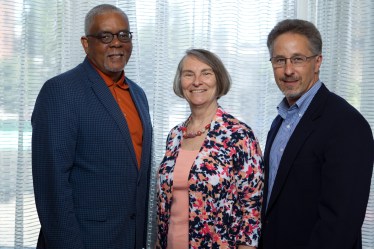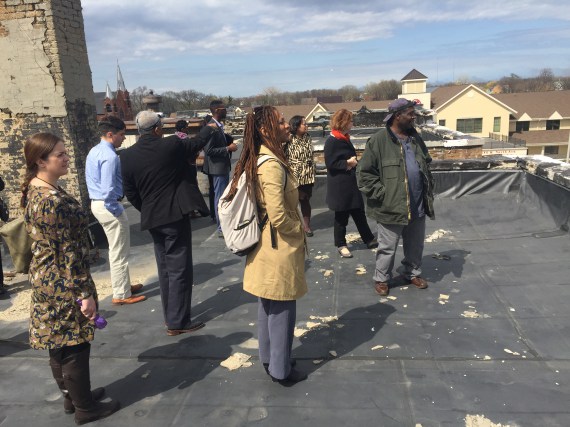An Inside Look at Equitable Economic Development in Milwaukee
In response to the tragic events in Charlottesville, the National League of Cities is celebrating #InclusionWeek to support diversity, inclusivity, and hope in America’s cities. This post is part of a series on NLC’s Equitable Economic Development (EED) Fellowship.
Martha Brown, Ken Little and Matt Haessly are part of the Equitable Economic Development (EED) Fellowship team from Milwaukee. This week, they reflect on their experience in the program and how they are looking to advance the city’s Community Revitalization Ownership Project (CROP).
Carlos Delgado: Hi Martha, Ken and Matt. Thank you for you participating in this interview series highlighting the great work cities in the EED Fellowship are doing to target economic development programs at the specific populations that have been shortchanged by traditional tools. Before we discuss why equity is an economic development priority for Milwaukee and Mayor Tom Barrett, could you tell us what department you represent in city government?
Martha Brown: Thank you so much, Carlos, for this opportunity. This has been a great year for Milwaukee in moving forward our CROP project. I am the deputy commissioner in the Department of City Development, Ken is the commercial corridor manager and Matt is the real estate specialist for the City.

Martha Brown, Ken Little and Matt Haessly of Milwaukee, Wisconsin.
CD: Thank you Martha. Could you tell us why an equitable economic development agenda is a priority for Milwaukee and Mayor Barrett?
MB: For the past 30 years, our city has been in a period of transition, on many levels. The racial makeup of Milwaukee has changed dramatically; what was for most of its history a city whose population largely had roots in northern Europe is now a majority-minority city, with African-Americans making up 40 percent of the population and Latinos making up 17 percent of the population. The economy also has undergone major transition; many of the manufacturing firms that made Milwaukee the “machine shop of the world” for the first half of the 20th century have moved production overseas, resulting in a significant loss of unionized manufacturing jobs. They have been replaced by both low-wage service jobs and high-wage, high-skill employment opportunities.
These transitions have had disparate impacts on various segments of Milwaukee’s population. The city ranks poorly on many measures of race-based disparity including income, education levels and employment. As Milwaukee adapts to its new economic and demographic realities, equitable economic development policies are an important ingredient in a larger strategy to ensure that all of our citizens and all of our neighborhoods benefit from change and growth and have a stake in the future of Milwaukee.
CD: The city currently owns, manages and markets a large portfolio of foreclosed properties, mostly located in distressed low-income neighborhoods. Ken, can you tell us a bit more about the framework you are trying to create to match responsible development with entrepreneurs who want to open a business?
Ken Little: As you pointed out, the city of Milwaukee owns a significant inventory of tax-foreclosed commercial buildings in low-income neighborhoods that lack access to many needed goods and services. These vacant buildings are highly visible symbols of distress: targets for vandalism and criminal activity that threaten the value and image of nearby properties.
We wanted to design a project that would make these buildings into opportunities to increase property ownership and build wealth among people who care about the health of low-income neighborhoods. We believe that, once renovated, these modest buildings can provide low-cost commercial space in underserved markets. Many are located in neighborhoods adjacent to Milwaukee’s current downtown development boom. We believe that the renovation of these buildings can spur neighborhood revitalization as they provide space for entrepreneurs and emerging new uses such as maker spaces.
We call our project CROP: Community Revitalization Ownership Project. CROP has four goals:
- Increase the sale and redevelopment of tax-foreclosed commercial buildings owned by the City of Milwaukee
- Provide opportunities for minority and immigrant developers to obtain development experience by purchasing and renovating small, tax-foreclosed buildings
- Attract entrepreneurs to occupy vacant, renovated properties in Milwaukee neighborhoods
- Return jobs and business activity to distressed commercial districts
CROP employs two key strategies: targeting the redevelopment opportunities for these buildings to minority residents interested in commercial development, and creating partnerships to develop a pipeline of entrepreneur tenants, identifying renovation financing, and identifying technical assistance resources to support entrepreneurs.

NLC’s Equitable Economic Development Fellowship team visits Milwaukee.
CD: The two-strategy approach makes this program unique. Talking about progress, Matt, can you elaborate about what has been done since June 2016 and what’s next after the EED Fellowship year?
Matt Haessley: Milwaukee’s EED team collaborated with the Associates in Commercial Real Estate (ACRE) program operated by the Local Initiatives Support Corporation (LISC) Milwaukee office to implement CROP. ACRE provides a nine-month commercial real estate training program to minority students. During the 2016-2017 training program, ACRE students all developed revitalization and re-use concepts for city-owned tax-foreclosed commercial properties as part of their ACRE course. We are continuing to work with several of the ACRE students to determine whether they can actually pursue purchase and development of the properties on which they focused during their classwork. We have identified city funds that could provide gap financing for several CROP development projects.
Milwaukee’s EED team also created an advisory committee consisting of representatives of lending institutions, ACRE, the U.S. Small Business Administration and Wisconsin’s largest micro-lender. The committee provided advice about financing opportunities and undertook a space needs survey among local start-up businesses.
There are two important next steps that continue CROP following the EED fellowship:
(1) LISC is exploring changes to ACRE that would more clearly focus classroom instruction and student selection on neighborhood-based development projects.(2) The city of Milwaukee, LISC and several other organizations are pursuing the creation of Brew City Match, a program modeled on the Motor City Match initiative that matches vacant property with entrepreneurs needing space. We believe spaces identified for development through CROP would be appropriate candidates for Brew City Match investment.
CD: Looks like your project relies heavily on strong partnerships among different stakeholders. Can you expand how important is to forge collaborations among different groups?
MB: The partnership with the ACRE real estate training program was central to the concept of CROP. ACRE students are committed to exploring opportunities in real estate development, and many come from the very neighborhoods in which city-owned vacant buildings present both challenge and opportunity. We shaped CROP to engage their talents and commitment to neighborhood improvement. Our advisory committee also has been an important element, providing ideas and perspectives that have helped to shape the project.
CD: One of the highlights of the program is the peer-to-peer learning exchange opportunity and the visit of subject matter experts to each city. Could you tell us what that experience was like and what role the EED Fellowship has played in your professional development?
MB: I participated in the visit to Charlotte, N.C. I was particularly interested to learn about the state-imposed restraints that impact city policies and enjoyed wrestling with strategies that, despite state constraints, could help Charlotte achieve greater involvement of minority-owned businesses and local workers in city-assisted projects. The visit of the peers and technical assistance experts generated some intriguing perspectives that could support CROP going forward. I have greatly appreciated the chance to interact with peers, learn from experts and evaluate some of the things we do in Milwaukee.
KL: I participated in the Houston visit where I was both pleased and impressed to meet the Rose Fellows who added a well-informed perspective on development issues for the Houston project. They really set the pace for our work in Houston. As for the TA offered during the visit to Milwaukee, I believe the panel did a great job of adding perspective from another vantage point to our city’s efforts. It was great having experts with direct connections to Milwaukee which I believe brought a more committed perspective to their feedback. The ideas and insights garnered from NLC Small Business Summit; the Webinars and the interaction with peers from across the country certainly brought me current with relevant economic development topics/issues and inspired new thinking for solving our community’s problems. From Makers space to Pop-Ups and Incubator spaces, I left the program much more informed than when I started.
MH: I participated in the Charlotte presentation. I thought it was a good opportunity for the city of Charlotte to present their equitable economic development program to the neighborhood groups and state stakeholders. Shortly after Charlotte’s presentation that identified a disconnect between Charlotte and the state, a state representative said he would be glad to work closer with Charlotte. Sometimes removing the tunnel vision and having an open, honest discussion with your partners results in new ideas that may benefit everyone or at least soften some those barriers hindering success in certain neighborhoods. I enjoyed listening and learning from all of the experts and especially the fellows that face similar hurdles and challenges as Milwaukee.
While listening to the experts was beneficial, I believe the one-on-one conversations I had with the fellows during the breaks or lunch/dinners was even more beneficial. Each city has unique programs that I believe we were all able to learn from and likely implement into new programs or policies that will make a positive difference in a neighborhood or even one block at a time.
CD: It has been a pleasure working with you last year and seeing all the progress you have made. To conclude any advice to the incoming fellows/class?
KL: Enjoy the ride and be intentional about the solving the problem of equity in the communities in your respective cities.
MH: Creating the groundwork for equitable economic development is something every municipality needs to address. Share your city’s policies, successful programs, as well as the road blocks that may be hindering equitable economic development with the invited experts and fellowship colleagues. Every municipality is suffering many of the same problems but listening and collaborating with your Fellowship colleagues will add new ideas of how to improve the challenges of addressing equitable economic development in your municipality.



